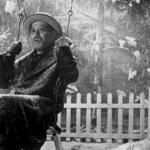Review of Marjoe, Directed by Sarah Kernochan and Howard Smith
Marjoe is a 1972 documentary that follows Marjoe Gortner on his final revival preaching tour. Marjoe was a well-known child preacher, starting his career at the ripe age of 4 years old. After becoming disillusioned with what he was doing, Marjoe decided to come clean, and so this documentary was born. The film crew follows Marjoe to his revival meetings and records him explaining how this business known as “evangelism” works. What we get is a heart-wrenching look at the diseased “Christianity” that plagued churches in mid-twentieth century America—and that continues to plague us today.
Marjoe won an Oscar for best documentary. Although seemingly forgotten for many years, recently Marjoe has been revived. According to Wikipedia, the film’s negative was found in 2002 and later was restored and shown at the IFC Center in 2005. (You can watch the entire documentary online here.) Unfortunately, its re-release still speaks a relevant word to us.
A majority of the footage is Marjoe preaching at revivals as the film crew captures the chaos that ensues with people coming forward to donate money, worshipers falling to the ground (“slain in the spirit”), and shouts erupting of “thank you Jesus” and “praise Jesus”. Marjoe is quite the charismatic actor with the ability to intertwine biblical themes, vague Scriptural quotations, and repetitious phrases. Marjoe visits several churches and tents throughout the documentary, each time being invited by another preacher/pastor that shares the same philosophy of ministry (if “ministry” is what you want to call it).
Interspersed between the long clips from each revival meeting are short interviews with Marjoe as he explains how he whips the crowds into a spiritual fervor; what tricks and gimmicks are needed to get good speaking slots on the circuit; and the “business model” of magazines, radio, and other methods used to in the cash. Marjoe admits that he loves being behind the mic, but that after each revival he would feel empty and consider retiring from his itinerant preaching career (until he became strapped for funds).
The heartache in this film stems from three founts: 1) Marjoe’s personal disillusionment, 2) Marjoe’s relationship with his parents, and 3) the deceived worshippers.
Marjoe is clearly jaded by the whole enterprise. He explains how he dislikes preaching about hell and judgment, even as he knows he needs to do it to get the desired response from the audience. Marjoe never really believed what he preached, never considered what it was to be a true Christian. He merely did his job; that is, get people to give him money in exchange for a psychosomatic experience. Several scenes show Marjoe or a revival organizer counting the money after a meeting.
Most disturbing are Marjoe’s parents. Marjoe’s father is shown at two of the revivals in the documentary. Their revival gimmick was having a 4-year-old preaching son. Marjoe recounts how his mother would make him spend all his time memorizing sermons. When he lagged behind his mother would punish him by sticking his head under water (she avoided hitting him, Marjoe alleges, to make sure he had no marks on his body for cameras to pick up). As much as Marjoe’s personal story is depressing, his childhood is even worse. He confesses that he doesn’t have much of a relationship with his father, though they tour at times together.
Throughout Marjoe, we see masses of sincere worshipers being led astray by false teaching. People give up their hard-earned money because they are taught that God asks it of them. Marjoe and others like him fleece these ignorant sheep. This is simply perverse and tragic.

Unlike most religion-focused documentaries these days, Marjoe does not use this widespread phenomena as a blanket indictment of all Christianity. The film offers up the story of Marjoe as it is, without a clear agenda, letting it speak for itself. But there is little doubt that this type of “Christian” religion is alive and well. Shai Linne’s controversial song “Fal$e Teacher$” makes that very clear.
The church needs faithful teaching and faithful leaders. Marjoe’s preaching and the preaching of others on the circuit lacked any meat. It was watered-down drivel that played on emotions through shouting, melodramatic body movements, and the ever present and spontaneous “thank you Jesus”. There was little teaching of repentance, but a lot of teaching about freedom and the better life. One preacher outright said that God had given him a Cadillac as a reward or blessing for his decision to become a preacher.
Sadly, it was oftentimes church leaders that invited Marjoe to come speak to their congregations. These under-shepherds let in the wolves, if they were not wolves themselves. We are told that “Not many of you should become teachers, my brothers, for you know that we who teach will be judged with greater strictness” (James 3:1). Christians must be trained to think so that local churches will not succumb to false teaching. Marjoe is a parable for local churches to guard doctrine and appoint godly, trustworthy leaders to follow.












